VietNamNet would like to introduce an article by Mr. Mai Phan Dung, Director of the Department of Cultural Diplomacy and UNESCO Affairs at the Ministry of Foreign Affairs.
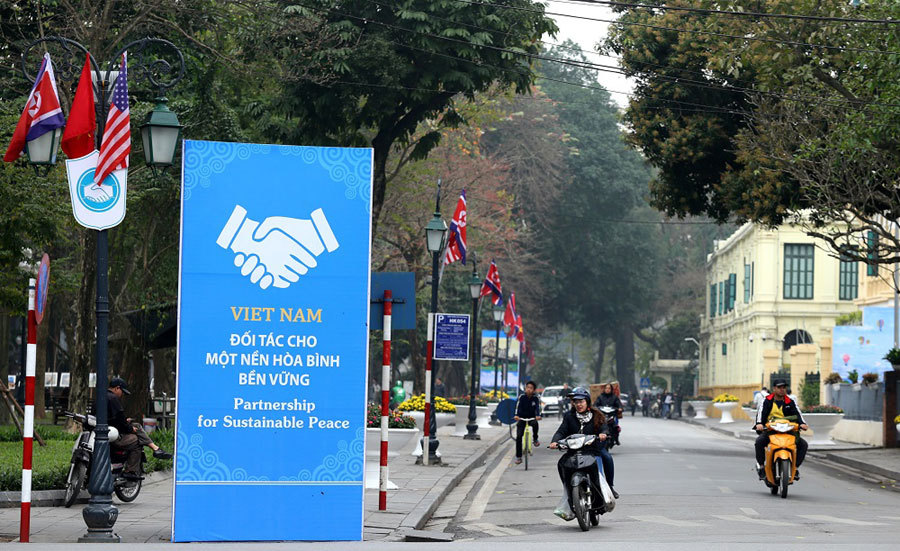 |
Today, in international relations, besides hard power, all countries are interested in strengthening and promoting soft power, thereby creating a national synergy.
Joseph S. Nye, an American political scientist, defines the term “soft power” as “the ability of a country to persuade others to do what it wants without force or coercion". He summarizes that a nation's soft power is built on three bases: institutional value, domestic policy, foreign policy and cultural value.
The country’s own values
For Vietnam, soft power stems from the country's own values such as history, tradition, culture, humanistic ideology, the conceptual system of human life and worldview and the accretion, care and promotion of these values through the policies of the Party and the State as well as the awareness and action of each Vietnamese person at home and abroad.
Vietnam's soft power source has outstanding features:
First of all, due to its special geographical location, Vietnam is considered a bridge connecting continental Asia and Europe with Southeast Asia and Northeast Asia, and the commercial gateway between the Pacific and the Indian Ocean. But also because of this geographical position, Vietnam always had to fight against foreign invaders.
Understanding the devastation of war, the Vietnamese people attach more importance to the value of peace, always seek to save peace, to avoid war. However, when facing strong enemies, the Vietnamese people always show their solidarity and indomitable spirit. The creativity in the art of military and ingenious diplomacy has created glorious victories in the nation’s history.
The interesting thing is that after the victories, Vietnamese people are always generous and tolerant of the defeated, then are ready to make peace and harmony, and put aside the past to look forward to the future. This is the noble ideal that today's world is reaching out together.
Secondly, throughout history, due to the geographical location as the connection point between the North and the South, the West and the East, Vietnamese culture is influenced by many major cultures, including Chinese, Indian and Western cultures.
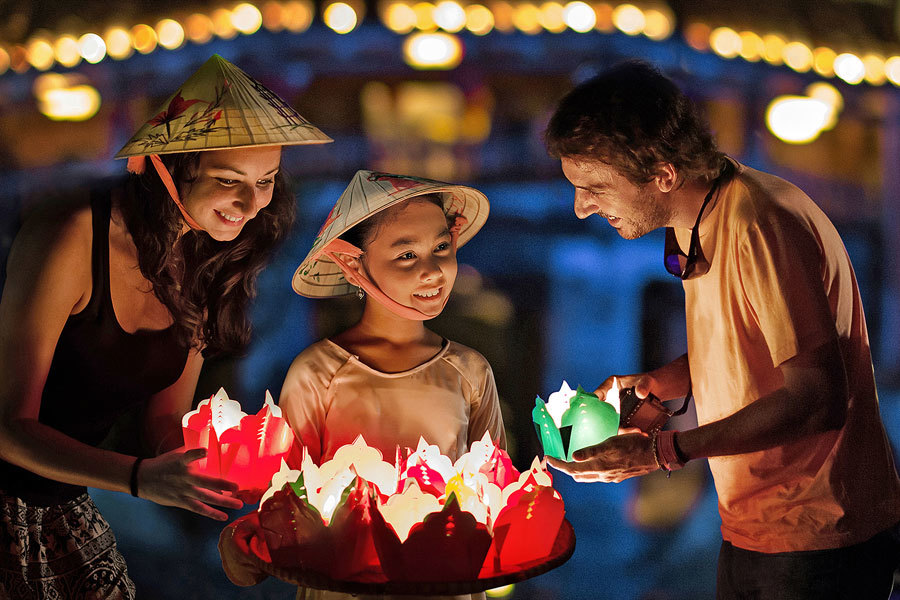 |
|
|
However, the Vietnamese people still preserve their traditional identities, skillfully absorb and select the external cultural quintessence that suit their own culture, customs and beliefs, thus avoid the assimilation of great cultures. Confucianism, Buddhism, Christianity, Islam ... when being imported into Vietnam, were partly transformed, directing people to think and act according to the values of truth, goodness and beauty.
Thirdly, although the territory of Vietnam is not too large, it has diverse terrains and geographies, where 54 ethnic groups live together. This has created the richness of languages, costumes, cuisines, art performances, religious activities ... This richness and diversity have created a multicolored cultural picture, which is full of the charm of the Vietnamese people.
Fourthly, with a long history of building, defending the country and conquering nature, the Vietnamese people have completed the system of concepts and ideologies on human life and worldview with typical features: harmonious relationship, love between man and man, between man and nature ... These are also the factors that create modern Vietnamese people with industrious, creative qualities, simple but profound, those who love labor, love nature and have full sense of environmental protection.
From the beginning
During thousands of years of struggling for independence, unity, expansion of the territory and protection of territorial integrity as well as in the time of building the country, Vietnamese people have flexibly applied cultural diplomacy through the strategy of "diplomacy of the heart" and the diplomatic measures of peace.
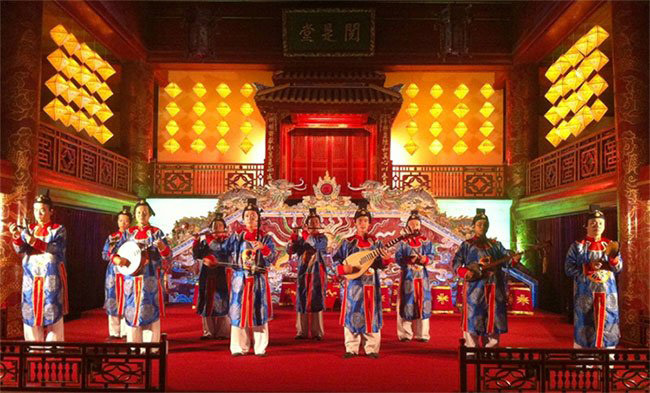 |
|
Hue royal court music is the intangible cultural heritage recognized by UNESCO |
Today, cultural diplomacy is identified as a pillar, along with political diplomacy, economic diplomacy and overseas Vietnamese-related affairs to create a comprehensive and modern Vietnamese diplomacy. The connotation, attitudes, goals and measures of cultural diplomacy are clearly defined in the Strategy for Cultural Diplomacy to the period 2011-2020.
Over the past 10 years, cultural diplomacy has been methodically deployed, both at home and abroad. Thereby, information and images about the country, culture, history, people and policies of Vietnam have been promoted, disseminated and widely spread, helping people in the world understand, sympathize and love Vietnam, thereby leading to the decision to choose Vietnam as a destination for cooperation, investment, travel, use of Vietnamese branded products and services ... or support Vietnam’s views and policies.
Cultural diplomacy activities have contributed to blurring the image of a poor, backward and war-ravaged Vietnam to replace it with the image of a modern country still retaining traditional values, a country that is open and friendly, loyal to friends, respects partners, responsible for world affairs.
Made in Vietnam in the international arena
The "Made in Vietnam" or "Made by Vietnam" products are increasingly gaining positions in the world market. Cultural diplomacy activities have contributed to promoting an increasingly close and friendly image of Vietnam in the world, amid the trend of integration. Cultural diplomacy activities are also good opportunities for Vietnamese people to understand more about many cultures around the world.
Overseas Vietnamese representative missions have actively coordinated with domestic agencies as well as local authorities and people to organize many cultural diplomacy activities with diverse and creative content and forms to effectively introduce and popularize the directions, policies, potential and strengths as well as history and culture of the country and people of Vietnam, thereby contributing to deepening relations with other countries, especially strategic partners.
Outstanding cultural diplomacy activities are the introduction and promotion of Vietnamese philosophies and ideas through many forms of honoring typical individuals such as cultural celebrity Nguyen Trai, great poet Nguyen Du, teacher Chu Van An ... and especially President Ho Chi Minh.
Activities to honor President Ho Chi Minh abroad have been actively responded to by local authorities and people through the construction of statues, monuments, parks, museums, memorial houses ... named after President Ho Chi Minh or the organization of international exhibitions, seminars, the issuance of publications, movies, literature about President Ho’s life and career.
Events such as Vietnam Day, Vietnam Week have been held by the Ministry of Foreign Affairs in many countries with diverse contents on painting, cuisine, literature, and traditional arts, to promote friendly relations between Vietnam with partners and help people in host countries understand more about the country, culture and people of Vietnam.
Thanks to cultural diplomacy, international cultural organizations have granted many titles for the country’s heritage. To date, Vietnam has obtained 39 titles from the UNESCO in the fields of culture, science, education and information. These international titles have enriched the treasure of the cultural heritage of humanity, presented a great honor and promotion for the cultural values of Vietnamese people and helped international friends know about Vietnam’s culture and heritage.
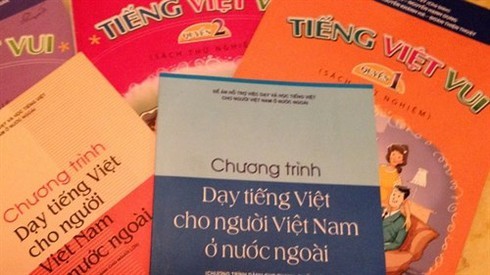 |
Teaching Vietnamese abroad
Teaching Vietnamese overseas is also a meaningful activity. The preservation and development of the Vietnamese language not only helps the overseas Vietnamese community to look to their homeland and the country, but also arouses pride for those who are living, working and studying abroad when they have also become messengers to spread Vietnamese culture across the five continents.
Today, those who love Vietnam know Vietnamese cuisine through popular dishes such as pho (Vietnamese noodles) and spring rolls, Vietnam’s handicrafts with lacquer paintings, Dong Ho paintings, ceramics, ao dai, conical hats, Vietnamese agricultural products such as rice, tea, coffee, Vietnam’s martial arts such as Vovinam, Vietnamese performing arts such as nha nhac (Hue royal court music), gong, love duets, ca trù singing, xoan singing, don ca tai tu (southern folk songs), bai choi singing, then singing, ans water puppetry, or cultural works such as Thang Long Imperial Citadel, Hue Citadel, Ho Dynasty Citadel, My Son Sanctuary ...
In the coming time, cultural diplomacy will continue to focus on major tasks: contributing to a peaceful and stable environment, taking full advantage of favorable international conditions for rapid and sustainable national development; promoting the image of Vietnam; preserving and promoting national identity; strengthening national strength; enhancing the country's international status and reputation; and at the same time actively contribute to the cause of peace, national independence, democracy and social progress in the world.
Mai Phan Dung
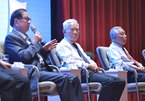
Veteran diplomats remember Vietnam’s 75 years of diplomacy
Senior diplomats who have directly contributed to many milestones of the diplomatic sector shared valuable industry lessons at a recent seminar "75 years of Vietnamese diplomacy: Lessons and direction”.